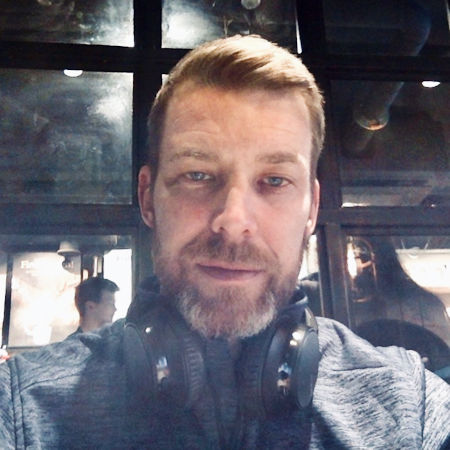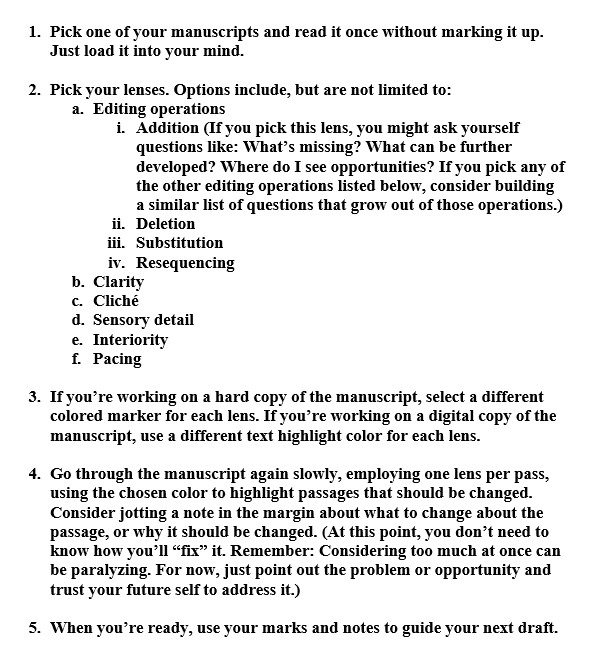 An axiom from the world of sales: If you give someone two choices, they’ll probably pick one. If you give them three choices, they’ll say, “I have to think about it.” If you give them four choices, they’ll say, “Forget it, I’m fine with what I have.” Our point: Considering too much at once can be paralyzing.
An axiom from the world of sales: If you give someone two choices, they’ll probably pick one. If you give them three choices, they’ll say, “I have to think about it.” If you give them four choices, they’ll say, “Forget it, I’m fine with what I have.” Our point: Considering too much at once can be paralyzing.
That point is valid for revising, too, which you may know if you’ve ever tried to “fix everything” in a single pass over a manuscript that needed a good deal of work. But how else are you supposed to go about it?
 When the poet Tom Lux revised his own work, he used an approach he referred to as “lenses.” He took multiple passes over a poem but only focused on one aspect per pass. If he was reading the poem through the “cliché lens,” for example, he only looked for clichés. Then he might take another pass with the “verb lens,” looking for passive voice and questioning every verb ending in -ing (e.g. the dubious “looking” and “questioning” in this sentence). Then another pass with the “line break lens,” and so on.
When the poet Tom Lux revised his own work, he used an approach he referred to as “lenses.” He took multiple passes over a poem but only focused on one aspect per pass. If he was reading the poem through the “cliché lens,” for example, he only looked for clichés. Then he might take another pass with the “verb lens,” looking for passive voice and questioning every verb ending in -ing (e.g. the dubious “looking” and “questioning” in this sentence). Then another pass with the “line break lens,” and so on.
Lux’s approach can be useful for nonfiction writers, too, because it gives you a specific and limited job for each pass. As an added benefit, your understanding of your manuscript and its architecture will deepen with each reading draft, so that after several passes with different lenses, you’ll see the bones of the manuscript more clearly than you could after the first or second read.
Ready to try? Here’s how:

Sometimes writers abandon a project because they don’t know what to do next in revision. Other times writers abandon a project because they’re overwhelmed by how much they need to do. Here’s the magic of this approach: Lenses can help with either problem. If you don’t know what to do next, lenses give you an entry point. If you feel swamped by the too-muchness of revision, this approach breaks it down into manageable tasks. Because lenses allow you to keep moving, they are one path toward improvement—for your project, and for you as a writer.
__
This essay is adapted from The Invisible Art of Literary Editing, co-authored by Bryan Furuness and Sarah Layden and forthcoming from Bloomsbury Academic in March 2023.
__
Bryan Furuness is the author of a couple of novels: The Lost Episodes of Revie Bryson and Do Not Go On. He lives in Indiana, teaches at Butler University, and believes that breakfast burritos are the perfect food.
Sarah Layden is the author of the forthcoming story collection, Imagine Your Life Like This (University of Wisconsin Press, April 2023); a novel, Trip Through Your Wires; and a chapbook of flash fiction, The Story I Tell Myself About Myself. She teaches creative writing at Indiana University-Purdue University Indianapolis.

8 comments
Amanda Le Rougetel says:
Jan 18, 2023
Thank you for this. I read it this morning and applied its wisdom this afternoon in an editing conversation with a colleague. It’s an excellent approach to what can be a daunting task. Much appreciated.
Judith Sornberger says:
Jan 19, 2023
What a helpful approach. Thank you!
Lin Brummels says:
Jan 19, 2023
This is a helpful idea. Thank you
Charlotte Wilkins says:
Jan 19, 2023
This is brilliant. When I revise I see so many of these things and I start fixing them all and get overwhelmed and somethings disgusted, like “Really? You thought that was good?”This is keeping me focused on one thing at a time. It’s a relief to revise in small doses. I just shared this with two of my writing groups. Thanks.
Isis says:
Feb 23, 2023
This is such a refreshing breakdown for editing/revision work. It definitely gives me helpful insight into how to break down the editing process into manageable tasks that won’t make me feel swamped. And by the end of the “Lense” process, I feel like you’re able to give the writer a more thought-out edited version of their work that visually shows them the constructive critiques without ripping their work into shreds. Will be using in the future!
Jessica says:
Apr 19, 2023
Are you able to present the list as text instead of an image so folks using screen readers can access the information? Thank you.
Dinty says:
Apr 24, 2023
Ready to try? Here’s how:
1. Pick one of your manuscripts and read it once without marking it up. Just load it into your
mind.
2. Pick your lenses. Options include, but are not limited to:
a. Editing operations
i. Addition (If you pick this lens, you might ask yourself questions like:
What’s missing? What can be further developed? Where do I see opportunities? If you pick any of the other editing operations listed below, consider building a similar list of questions that grow out of those
operations.)
ii. Deletion
iii. Substitution
iv. Resequencing
b. Clarity
c. Cliché
d. Sensory detail
e. Interiority
f. Pacing
3. If you’re working on a hard copy of the manuscript, select a different colored marker for each lens. If you’re working on a digital copy of the manuscript, use a different text highlight color for each lens.
4. Go through the manuscript again slowly, employing one lens per pass, using the chosen color to highlight passages that should be changed. Consider jotting a note in the margin about what to change about the passage, or why it should be changed. (At this point, you don’t need to know how you’ll “fix” it. Remember: Considering too much at once can be paralyzing. For now, just point out the problem or opportunity and trust your future self
to address it.)
5. When you’re ready, use your marks and notes to guide your next draft.
Diane Parrish says:
Apr 27, 2023
This is excellent. Thank you!